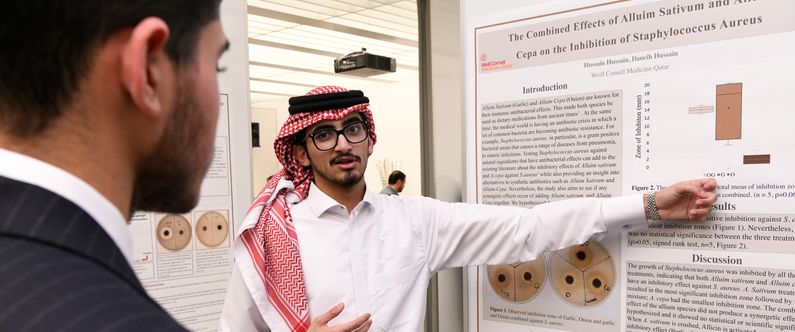Pre-med students present research posters
 Pre-med 1 student Hussain Hussain explains the findings of his research at the poster session.
Pre-med 1 student Hussain Hussain explains the findings of his research at the poster session.
Pre-med 1 students presented the findings of their biology lab projects to their peers and faculty members at a poster session marking the culmination of work that spanned two semesters.
Working in small groups of two and three, the students conducted literature reviews and lab experiments to ascertain whether the anti-microbial effects traditionally ascribed to a variety of herbs, spices and other natural remedies could be supported with evidence.
The students cultivated several different species of bacteria in nutrient agar in petri dishes and then introduced the natural remedy, observing how far each was able to inhibit the bacteria’s growth. The students presented a total of 19 posters investigating natural remedies including eucalyptus oil, tea tree oil, ginger, galangal, oregano, wasabi, peppermint, figs, dates, cinnamon, garlic, pineapple and papaya, among others.
The project gives the students hands-on experience of conducting a research experiment from start to finish, starting with the conceptualization of a research question and then formulating a hypothesis, conducting experiments, collecting and analyzing data, and creating posters to communicate their findings. The final step is to present the posters at the poster session and field questions about their findings from students and faculty. The students worked on their projects in biology classes over the course of 16 weeks during the fall and spring semesters.
Dr. Kuei-Chiu Chen, Associate Professor of Biology, said: “The beauty of this project is that it underlines for students the importance of not only knowing and understanding the science but also of being able to communicate it accurately to others. I have been extremely impressed with the quality of the research they produced and the confidence with which they presented and talked about it.”
Students Saadah Al Mohannadi, Imaneh Qaedi and Moza Al-Hail presented a poster about their research comparing the anti-bacterial properties of eucalyptus oil to the pharmaceutical drug streptomycin. The students took agar plates spread with staphylococcus aureus bacteria and introduced varying concentrations of streptomycin and eucalyptus oil before incubating the plates at 37°C for 24 hours. They then measured the ‘inhibition zones’ on the plates where growth of the bacteria was inhibited.
Saadah said: “We found that E. globulus (eucalyptus oil) had a positive inhibitory effect on the S. aureus bacteria, equivalent to 0.5mg/ml of streptomycin, but that streptomycin’s antimicrobial effect exceeds that of E. globulus quite significantly as concentration increases. We really gained a lot from the experience – it was really rewarding to be able to confirm what we read in the literature by designing and conducting our own experiment.”
